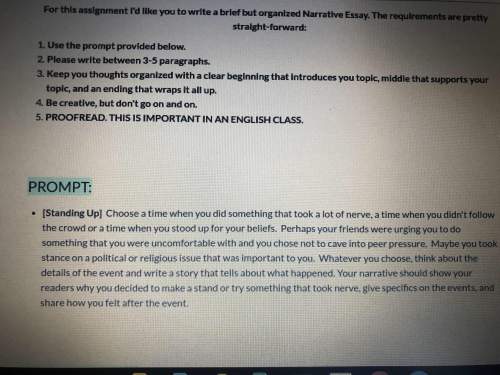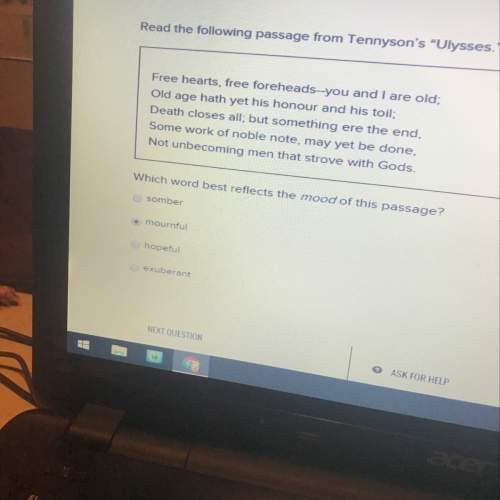
English, 08.12.2020 01:00 whatsupp123
100 POINT
Read the two passages and answer the question.
Passage 1: "Midas" retold by Thomas Bulfinch
[1] Bacchus, on a certain occasion, found his old schoolmaster and foster-father, Silenus, missing. The old man had been drinking, and in that state wandered away, and was found by some peasants, who carried him to their king, Midas. Midas recognized him, and treated him hospitably, entertaining him for ten days and nights with an unceasing round of jollity.
[2] On the eleventh day he brought Silenus back, and restored him in safety to his pupil. Whereupon Bacchus offered Midas his choice of a reward, whatever he might wish. He asked that whatever he might touch should be changed into gold. Bacchus consented, though sorry that he had not made a better choice.
[3] Midas went his way, rejoicing in his new-acquired power, which he hastened to put to the test. He could scarce believe his eyes when he found a twig of an oak, which he plucked from the branch, become gold in his hand. He took up a stone; it changed to gold. He touched a sod; it did the same. He took up an apple from the tree; you would have thought he had robbed the garden of the Hesperides. His joy knew no bounds, and as soon as he got home, he ordered the servants to set a splendid repast on the table. Then he found to his dismay that whether he touched bread, it hardened in his hand; or put a morsel to his lip, it defied his teeth. He took a glass of wine, but it flowed down his throat like melted gold.
[4] In consternation at the unprecedented affliction, he strove to divest himself of his power; he hated the gift he had lately coveted. But all in vain; starvation seemed to await him. He raised his arms, all shining with gold, in prayer to Bacchus, begging to be delivered from his glittering destruction. Bacchus, merciful deity, heard and consented. "Go," said he, "to River Pactolus, trace its fountain-head, there plunge yourself and body in, and wash away your fault and its punishment." He did so, and scarce had he touched the waters before the gold-creating power passed into them, and the river sands became changed into gold, as they remain to this day.
Passage 2: "Bacchus's Regret" by Hunter Doyle
[1] King Midas returned my beloved teacher to me,
so I rewarded him with a wish—whatever he wanted would be.
Midas cried, "Give my fingers a golden touch!
Then, I shall have a gilded kingdom and such."
[5] I tried to make him see the err of his choice,
but he would not heed the caution in my voice.
I pleaded with Midas, "Be careful what you choose,
for you're only thinking of what you'll gain—not what you'll lose."
[9] His thirst for wealth became no match for his appetite;
after all, a gold apple is not something one can bite.
His daughter wept for her poor starving dad,
so he wiped her tears and told her not to be sad.
[13] Into a golden statue Midas's daughter became,
and he and his greedy wish were ultimately to blame.
Yet, maybe if I had put up more of a fight and a fret,
then I wouldn't have to live with all this regret.
What is similar about how the authors show the theme greed can have negative consequences?
1.Both describe how Midas is starving because of his wish
2.Both explain that Midas's daughter becomes a statue
3.Both give details about the golden twig, stone, and bread
4.Both show how Bacchus takes pity on Midas and reverses his wish

Answers: 1


Another question on English

English, 21.06.2019 14:00
Which sentence in this excerpt from the time machine suggest that the time travelled will later realize that his assumptions about future society are incorrect
Answers: 1

English, 22.06.2019 04:00
What are your educational and professional goals and how will this program you achieve your goals?
Answers: 1

English, 22.06.2019 04:30
Briefly describe your ideas about elisa's connection to both the ranch or garden and the road setting of the story
Answers: 1

English, 22.06.2019 08:10
Robert was not waiting for her in the little parlor. he was nowhere at hand. the house was empty. but he had scrawled on a piece of paper that lay in the lamplight: "i love you. good-by—because i love you." what significant idea, presented throughout the novel, does robert's final departure and note highlight? edna is ultimately alone in her rebirth. edna needs to find solace in her children. edna will never be truly loved by anyone. edna should not have forsaken her family.
Answers: 2
You know the right answer?
100 POINT
Read the two passages and answer the question.
Passage 1: "Midas" retold by T...
Passage 1: "Midas" retold by T...
Questions










Mathematics, 14.04.2020 18:53

Social Studies, 14.04.2020 18:53


Mathematics, 14.04.2020 18:53











